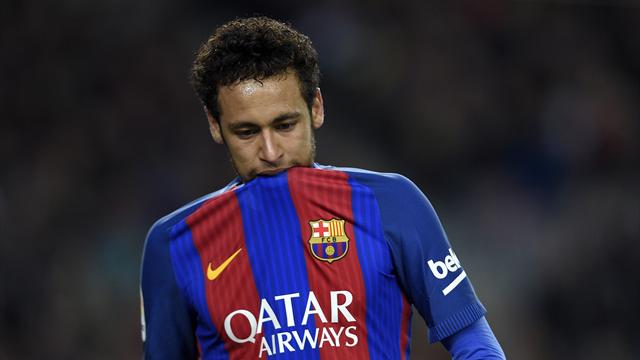
What happened?
Paulo Dybala hit a brace as Juventus dismantled Luis Enrique’s men 3-0 during their Champions League quarter-final first-leg tie at the Juventus Stadium.
What is the significance?
Having already been admonished 4-0 by PSG in the previous round, the result can’t be dismissed as an anomaly.
If anything the 6-1 comeback win against the French champions was the anomalous result. As it stands, capitulation against European elite is edging towards the norm. There is something amiss at the innards of the club and the team, and it needs addressing.
However, before looking at the problems that currently beset them, the successes – and more importantly – the factors that underpinned those successes must also be understood.
An era-defining side packed with era-defining players
Since winning La Liga in 2005, the Catalans have enjoyed a decade or so of near-unparalleled success, adding a further seven league titles, four Copa del Reys, seven Supercopa de Espanas, four Champions League titles, two European Super Cups and three FIFA Club World Cups.
As extraordinary as that roll call of trophies are the players that lifted them; to name a few: Samuel Eto’o, Ronaldinho, Thierry Henry, Carles Puyol, Gerard Pique, Dani Alves, Andres Iniesta, Xavi, Sergio Busquets, Lionel Messi, Luis Suarez and Neymar.
FC Barcelona’s Brazilian Ronaldinho (R), French Thierry Henry (L) and Cameroonian Samuel Eto’o (C) take part in a first training session at the Camp Nou Stadium in Barcelona, 21 July 2007.AFP
Some of these players have redefined the understanding of their respective positions. Lionel Messi and Xavi are obvious candidates but Dani Alves warrants a mention. Here was, to all intents and purposes, a number 10 operating as a full-back. In their pomp, they had a multitude of weapons at their disposal.
A perfect storm: Talent, philosophy and the tactical fundamentalist
More than any other, Barcelona have a playing philosophy that defines their club.
However, having a well-defined philosophy and the players and a coach to execute it are two wholly different propositions.
The period from 2008 to 2012 represented the perfect storm of all three. The club had produced a cohort of youth team players that were well-versed in the intricacies the club’s ideology and a coach in Pep Guardiola who steadfastly refused to compromise those ideals.
Guardiola reportedly detests the phrase tiqui-taca (tiki-taka). However, there is no denying that midfield control and specifically ball monopolisation represented the central tenet of their success.
Xavi, a student of the game in the mould of Guardiola himself, embodied this era-defining Barcelona – an on field general dictating via the medium of possession. With Busquets and Iniesta willing and more than able deputies, Barcelona redefined how to dominate a football match.
Barcelona’s midfielder Xavi Hernandez (L) and Barcelona’s midfielder Andres Iniesta celebrate with the trophy after the UEFA Champions League Final football match between Juventus and FC Barcelona at the Olympic Stadium in Berlin on June 6, 2015. FC BarceAFP
This, of course, makes no mention of a front three that over the course of the last decade has included Henry, Pedro, Eto’o, Zlatan Ibrahimovic, Ronaldinho, Messi, Suarez, and Neymar.
The problem with era-defining players…
…is attempts to replace them are often futile.
However, Barcelona have made a remarkably bad fist at even partially replacing players of the ilk of Carles Puyol and Xavi. Granted, it is a thankless task.
Yet, for a club with the scope and appeal of Barcelona, it is a dereliction of duty by those in charge of recruitment that Jeremy Mathieu, Thomas Vermaelen and Samuel Umtiti have been identified as replacements for Puyol, who retired in 2014. The first two have been abject failures while it is too soon to pass any sort of definitive judgement on Umtiti.
However, it is in midfield where the gravest misdeeds have transpired. Xavi was the indispensable component to the success. The constant. In different ways, he was the catalyst to both trebles.
Yet, since he left the club in 2015, Arda Turan and Andre Gomes have arrived as marquee signings. Both fine players but stylistically completely different to Xavi. The issue is not that Barca have failed to find a like-for-like replacement; the issue is that they have failed to sign an anything-like for the greatest midfielder in the club’s storied history.
Barcelona’s Xavi (C) and Ivan Rakitic celebrate with the trophy after winning the UEFA Champions League FinalReuters
In mitigation, complicating the task ahead of the player charged with succeeding Xavi are the intangibles that marked his skillset.
Perhaps the hierarchy acknowledged the implausibility of unearthing another Xavi when the decision to recruit the far more direct-in-nature Ivan Rakitic was taken back in 2014. In fact, since his appointment Luis Enrique has made Barcelona more direct, and there is solid logic behind getting the ball forward quickly as possible when Barca are as top heavy as they are.
However, it has left Barcelona lopsided. Iniesta’s influence on games – while still eye-catching – has waned. And Busquets, swamped with players whose understanding of the game no longer mirrors his own, has been left isolated, unable to dictate from deep.
The playing staff is lopsided and so is the system. Yet, recruitment has been a problem at the club for years. Amongst the big successes there have been a considerable number of expensive flops: Aleksandr Hleb, Dmytro Chygrynskiy, Zlatan Ibrahimovic, Alex Song and Aleix Vidal.
Devoid of a spine but elevated by greatness
Said transfer travails have left Barca headed towards a meek, and at times, feeble spine.
Yet, greatness has the ability to mask the inadequacies of its surroundings. And in Lionel Messi, Luis Suarez and Neymar, Barcelona have three greats of the modern game.
However, over-reliance on individual brilliance is a sure fire route to inconsistency.
For reference, Barcelona had only need observe the travails of Real Madrid’s Galactico policy; for it is surely no coincidence that their spike in success has correlated with a more tempered transfer policy. Luka Modric, Casemiro and Toni Kross represent a midfield blend far more in tune with the ideology of Futbol Club Barcelona.
This is not the end of Barcelona: their model is not broken; they have just failed to adhere to it.




